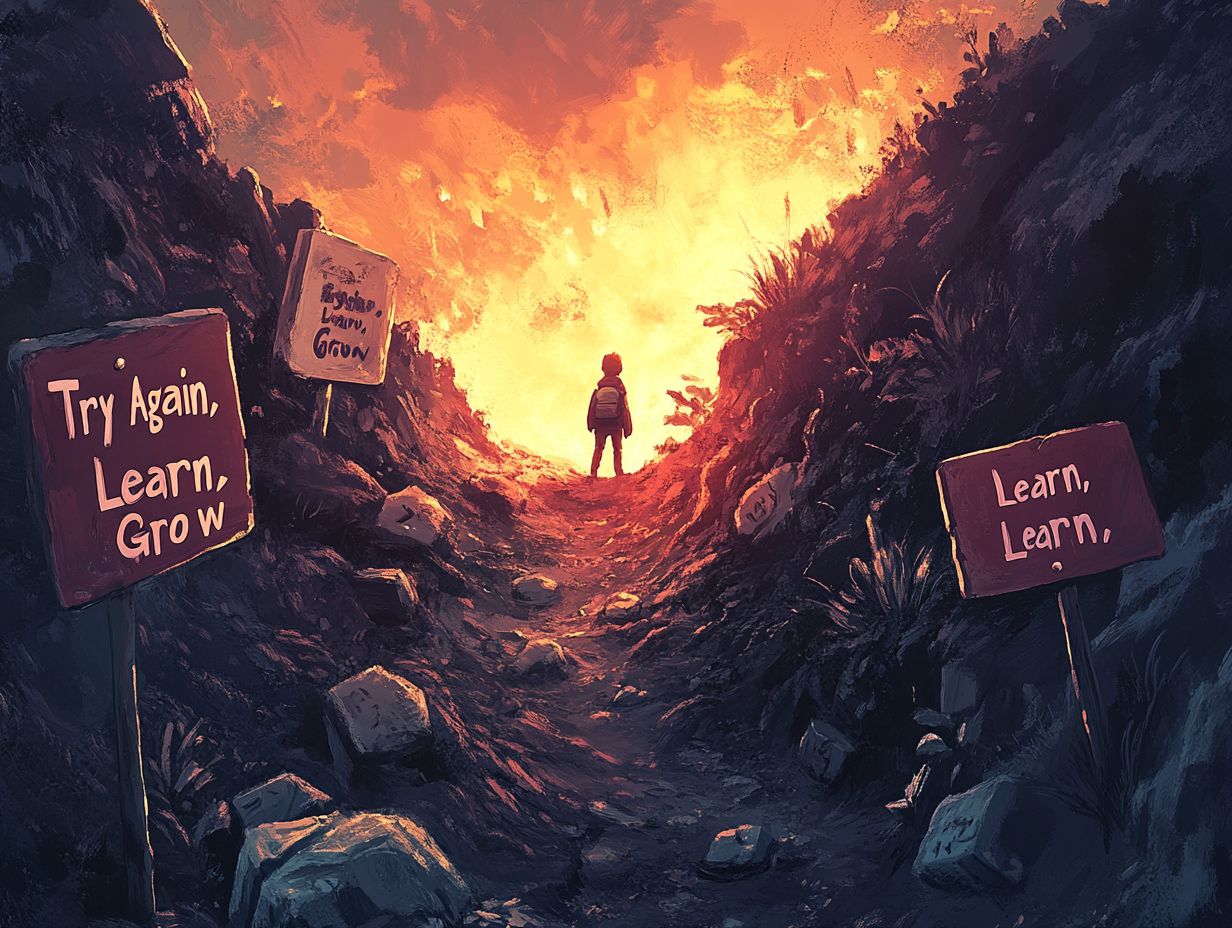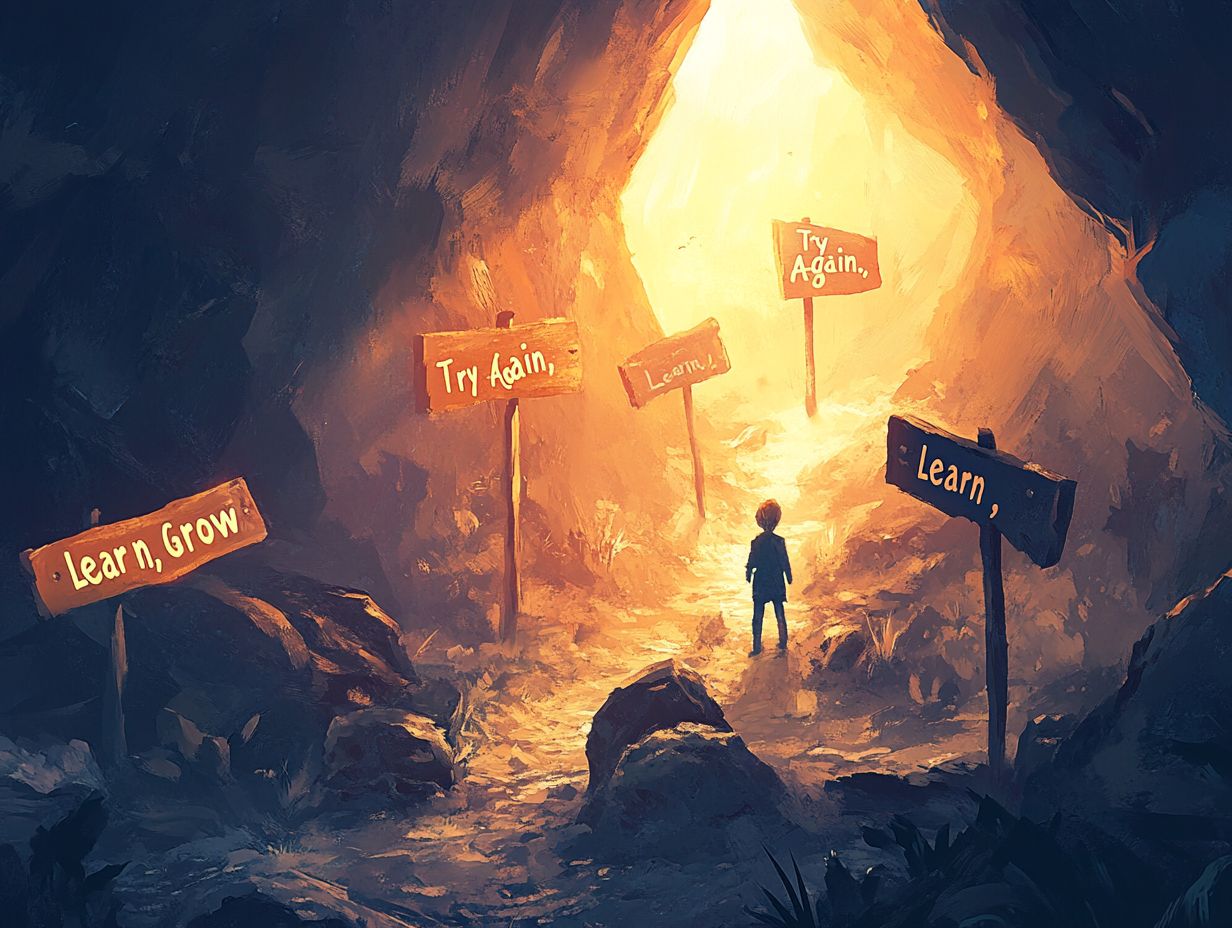Learning from Failure: A Path to Achieving Goals
Failure is often seen as a setback. Yet, it can serve as one of the most powerful catalysts for your growth and success.
This exploration delves into the many-sided nature of failure. It examines its definition, its impact on your goals, and the invaluable lessons it presents.
You ll discover how shifting your mindset can transform failure into a golden learning opportunity. Practical steps will be outlined for you to reflect, identify lessons, and implement necessary changes.
Ultimately, embracing failure lays the groundwork for your personal growth, resilience, and enhanced goal achievement. Dive in to uncover how you can turn setbacks into stepping stones.
Contents
- Key Takeaways:
- Understanding Failure
- Embracing Failure as a Learning Opportunity
- Steps to Learning from Failure
- Benefits of Learning from Failure
- Frequently Asked Questions
- What is the concept of learning from failure as a path to achieving goals?
- Why is it important to learn from failure when working towards goals?
- How can failure be turned into a positive learning experience?
- What are some common obstacles to learning from failure?
- Are there any benefits to embracing failure as a tool for growth and progress?
- What are some strategies for effectively learning from failure?
Key Takeaways:

- Failure is part of the journey to success.
- Shift your mindset to view failure as a learning opportunity.
- Reflect, learn, and grow from your experiences.
Understanding Failure
Understanding failure is essential for both personal and organizational growth. It uncovers the complexities of human behavior and various systems in businesses, educational institutions, and childhood development.
Whether preventable or insightful, failure can be a powerful stepping stone toward realizing your true potential especially when paired with strong leadership and a resilient organizational culture.
By embracing failure as a natural part of the journey, you can foster a culture of continuous learning and adaptability. This ultimately transforms setbacks into opportunities for future success.
Defining Failure and Its Impact on Goals
Defining failure means recognizing the many-sided impacts it has on your personal and professional goals. It’s essential to understand how it shapes your approach to overcoming career challenges.
It s not just a setback; it s an essential part of your journey toward success. When faced with failure, you might grapple with feelings of inadequacy and disappointment. Yet, within those struggles lies the potential for profound insights about your abilities and aspirations. This paradox underscores the notion that failure can be a powerful teacher.
Consider the journeys of renowned figures like J.K. Rowling and Albert Einstein, who faced significant rejections and setbacks before achieving their breakthroughs.
These examples highlight that the path to achievement is rarely straightforward. It s often filled with invaluable lessons that cultivate resilience and adaptability in you.
Embracing Failure as a Learning Opportunity
Embracing failure as a learning opportunity demands a shift in your mindset and perspective. Instead of viewing setbacks as endpoints, consider them invaluable experiences that cultivate your emotional resilience and enhance your coping skills.
Changing Mindset and Perspective

Changing your mindset and perspective about failure is crucial for your personal growth. By adopting a growth mindset, you open yourself up to the invaluable lessons that mistakes and setbacks can teach.
This transformation not only builds your resilience but also creates an environment where you can see challenges as opportunities for development. Embracing the idea that failure is merely a stepping stone allows you to explore various psychological frameworks that strengthen your emotional fortitude.
Techniques like mindfulness, changing how you think, and positive affirmations become essential tools in your resilience toolkit.
The guidance of mentors can significantly enhance this journey. As they share their experiences and strategies for overcoming obstacles, you gain insights that empower you to carve out your own path through adversity.
Steps to Learning from Failure
Learning from failure requires a thoughtful and systematic approach. Engage in reviews after an event to pinpoint key takeaways.
This practice fosters continuous learning and strengthens teamwork. Embracing this mindset turns setbacks into growth opportunities.
Reflecting on the Experience
Reflecting on your experiences of failure is crucial for extracting valuable lessons. This practice cultivates emotional resilience and transforms setbacks into meaningful learning experiences.
Engaging in techniques like journaling offers a structured way to process your feelings and thoughts about the failure. By writing down your experiences, you gain clarity on your emotions and can identify patterns in your behavior that need improvement.
Participating in group discussions creates a supportive atmosphere where you can share insights and strategies for overcoming similar challenges. Addressing failures collectively allows you to learn from others’ experiences while fostering camaraderie and mutual understanding.
These reflective practices enhance your emotional strength and empower you to face future obstacles with confidence.
Identifying Lessons Learned
Identifying the lessons from failure is a crucial step in your learning journey. It sharpens your self-awareness and equips you with effective coping strategies for future challenges.
By adopting a structured approach, such as a method to identify strengths, weaknesses, opportunities, and threats, you can dissect the issues that arose during the setback. This method sheds light on areas for improvement and uncovers personal capabilities you may have overlooked.
Establishing feedback loops fosters ongoing dialogue with peers and mentors, opening the door to fresh perspectives on your experiences. Ultimately, this combination of self-reflection and external insight deepens your understanding of personal growth, transforming past missteps into invaluable lessons for your future endeavors.
Implementing Changes for Future Success

Implementing changes based on the lessons learned from failure is essential for enhancing your adaptability and refining your strategic decision-making in future endeavors.
You must pinpoint areas for improvement while cultivating a culture where these insights translate into tangible actions. For example, in the financial services sector, organizations that proactively adopt updated risk management protocols after facing setbacks often excel in stability and trustworthiness compared to their competitors.
Similarly, telecommunications providers that delve into customer feedback and behavioral data can adjust their services with greater precision, tailoring offerings to meet evolving needs. By examining these sectors, it becomes evident that turning setbacks into systematic strategies lays a more resilient foundation, one that can navigate future challenges and seize growth opportunities.
Benefits of Learning from Failure
The benefits of learning from failure are manifold. It serves as a powerful catalyst for personal growth, enhances resilience, and paves the way for career success across diverse fields.
Embracing setbacks gives you a richer understanding of your journey and equips you with the skills to navigate challenges with greater confidence and insight.
Start applying these lessons today to unlock your potential!
Personal Growth and Resilience
Personal growth and resilience emerge directly from learning through failure, as you cultivate emotional strength shaped by your experiences and challenges. This journey will transform your understanding of your strengths and weaknesses and empowers you with remarkable adaptability.
Research shows that when you encounter setbacks, you’re more inclined to develop coping strategies for future challenges, transforming adversity into a springboard for success. Case studies reveal inspiring stories of individuals who, after facing significant failures, rose to become stronger and more self-aware. This illustrates the profound link between overcoming hardship and building emotional fortitude.
As you navigate through trials, you’ll come to appreciate the invaluable lesson of persistence. This ultimately enriches your personal development and fosters a more resilient mindset.
Improved Goal Achievement
Improved goal achievement is a remarkable benefit of learning from failure, as it encourages you to embrace accountability and define clearer objectives.
When you view setbacks as lessons rather than defeats, you create an opportunity for a deeper understanding of which strategies work and which do not. Reflecting on past mistakes allows you to gain valuable insights that sharpen your focus during the goal-setting process. This helps you establish more realistic and attainable targets.
Reflecting on your mistakes helps you take responsibility for your choices. Recognizing that your previous decisions led to unintended outcomes inspires a commitment to making more informed decisions moving forward.
Ultimately, this combination of reflection and responsibility enhances your planning stages and equips you with the resilience needed to tackle challenges head-on. This fosters a more strategic approach to overcoming obstacles on your journey to success.
Frequently Asked Questions

What is the concept of learning from failure as a path to achieving goals?
Learning from failure is the idea that failure can be used as a tool for growth and progress towards achieving goals. It involves reflecting on and analyzing past failures to gain valuable insights and make necessary changes for future success.
Why is it important to learn from failure when working towards goals?
Learning from failure allows us to identify and address areas for improvement, leading to more effective goal attainment. It also helps us develop resilience and adaptability, essential qualities for success.
How can failure be turned into a positive learning experience?
By reframing failure as a learning opportunity, we can focus on the lessons and knowledge gained rather than dwelling on the negative emotions associated with failure. This enables us to move forward with a more productive and growth-oriented mindset.
What are some common obstacles to learning from failure?
Fear of failure, ego, and a fixed mindset are common obstacles that can prevent effective learning from failure. These barriers can hinder our ability to reflect, take responsibility, and make necessary changes for future success.
Are there any benefits to embracing failure as a tool for growth and progress?
Yes, embracing failure can lead to personal and professional growth, improved problem-solving skills, and a stronger resilience to setbacks. It helps us overcome the fear of failure and take more calculated risks in pursuit of our goals.
What are some strategies for effectively learning from failure?
- Take time to reflect and analyze the failure.
- Seek feedback and advice from others.
- Set new goals and action plans.
- Maintain a growth mindset.
It’s also important to not dwell on the failure, but instead focus on moving forward and applying the knowledge gained.






